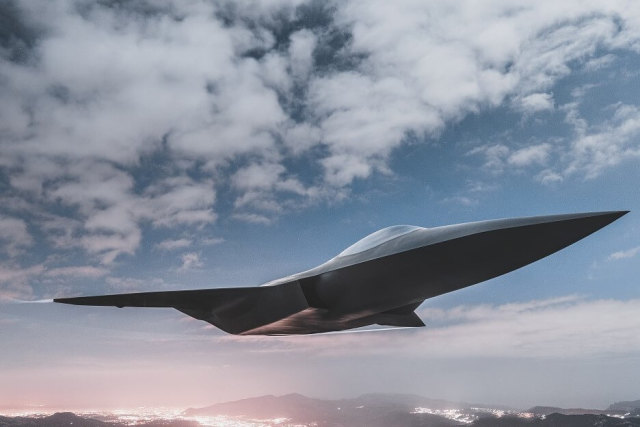Newspaper "The Financial Times" in the material Peggy Hollinger "Franco-German fighter jet project still faces turbulence. Macron and Scholz declarations are no guarantee of trouble-free collaboration on defense program" ("The Franco-German fighter project is still facing turbulence. The statements of Macron and Scholz are not a guarantee of trouble-free cooperation on the defense program") about the ongoing disagreements between the parties in the joint program of creation of a promising combat aviation complex (fighter) of the new generation Future Combat Air System (FCAS) carried out by France, Germany and Spain.

A conceptual image of a promising fighter Next Generation Fighter (NGF), created within the framework of the joint program of the advanced combat aviation complex of the new generation Future Combat Air System (FCAS) (c) Dassault Aviation carried out by France, Germany and SpainTwice in two weeks, French and German politicians announced a way out of the long impasse in their project to create one of the most complex fighter programs in the world - a system of systems combining manned aircraft, drones and advanced communications.
And twice they were put in place by Dassault Aviation, a French aerospace and defense company, which will lead the main part of the program - the creation of an artificial fighter [Next Generation Fighter - NGF].
Dassault executive Director Eric Trappier last week dismissed statements by French President Emmanuel Macron and German Chancellor Olaf Scholz about reaching an agreement to create a prototype as "pseudo-political." A few days later, after comments made by French Prime Minister Elisabeth Born in Germany, the company again insisted that no production agreement had been signed.
Dassault is playing a tough game, however, as always. Deeply integrated into both the political and military structures of France, the company is highly confident in its role as a guarantor of French sovereignty in the field of combat aircraft. The company, most of whose capital is controlled by the Dassault family, has always demonstrated a certain independence from the norms of corporate diplomacy when it came to expressing its opinion to politicians. But this is a good reminder that, no matter what politicians say, they will need eternal rivals for a flawless game - the French Dassault and the German-based Airbus Defense and Space corporation if they want Europe's largest defense project to succeed.
The two companies have long been irreconcilable rivals - ever since the days when Airbus owned a significant stake in a much smaller aerospace group as a proxy for the French government. Over the past year, they have struggled to figure out how to divide the intellectual property of a promising fighter and the development of an essential flight control system. These battles - sometimes overly emotional, according to people involved in the project - have already delayed the progress of work on the project for a year. To be fair, the politicians weren't entirely wrong. Some progress has been made in removing two obstacles at the so-called technology demonstrator stage.
According to a number of sources familiar with the subject of negotiations, it seems that the original flight control system proposed by Dassault will be used for the prototype of the aircraft. And, secondly, an obvious compromise was reached within the framework of a completely separate Franco-German program for the development of a promising tank. The German Bundestag has always insisted that fighter and tank projects be carried out in parallel in order to guarantee their country leadership in one of the joint projects.
Currently, it is expected that a production agreement on the so-called Phase 1B (Phase 1B) of the advanced fighter program can be signed within a few days.
But this does not guarantee a trouble-free future for the project, of which Spain is also a partner. Although Dassault may have won the battle for the prototype, there is still much to be fought for in the next stages of the program. For example, Airbus still expects to participate in the development of a flight control system that will be used for a production aircraft. Since this critical system is unlikely to be developed entirely from scratch, Airbus will need access to Dassault's intellectual property, which the French company still instinctively opposes.
Meanwhile, the German Bundestag continues to insist on an equal distribution of the technological advantages of the program. And there is no evidence that either side has significantly changed its position.
The politicians may have thought they could speed up the process with a public statement after a few reluctant concessions. But Dassault will not be forced. Her Rafale fighter is being sold like hot cakes, which is facilitated by state support. According to Trappier, with constant updating of the technical appearance, this machine will remain in operation for several more decades. The company can afford to wait it out if necessary.
At best, the agreement that will be signed by Dassault and Airbus will simply buy time for both sides to continue negotiations on the larger effects of the program. It seems there is hope that once they start working together, engineers, not politicians or senior management, will develop the positive momentum needed to implement the project.
This is a big gamble. From a political point of view, cooperation is important - it is a key element of Europe's desire for greater strategic autonomy in the field of defense. But this is not necessarily a tempting prospect for the industry. Neither Airbus Defense and Space nor Dassault would have chosen each other as a partner for the advanced fighter program. It is difficult to understand how "pseudo-political statements" can change this state of affairs.
